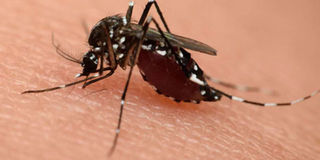Scientists find drug to curb malaria during pregnancy

A malaria-transmitting mosquito. Scientists at the Kenya Medical Research Institute have come up with a safe and superior drug for preventing and managing malaria during pregnancy. FILE PHOTO
What you need to know:
- The drug, dihydroartemisinin-piperaquine (DP) was found to be safe in the second and third trimester of pregnancy.
- DP is also highly effective in the treatment of clinical malaria.
- In Kenya, the trials will be done at the Ahero County Hospital in Kisumu, Rabuor Health Centre in Kisumu and Homa Bay Referral Hospital.
Scientists at the Kenya Medical Research Institute have come up with a safe and superior drug for preventing and managing malaria during pregnancy.
The drug, dihydroartemisinin-piperaquine (DP), a second line treatment for malaria, was found to be safe in the second and third trimester of pregnancy, and is also highly effective in the treatment of clinical malaria.
Trials done in Siaya County and in Uganda showed that the drug is more superior in preventing malaria in pregnancy than the commonly used Fansidar. When DP was taken as an intermittent preventive treatment for malaria in pregnancy, it was well-tolerated and more effective than Fansidar in preventing malaria.
The World Health Organisation recommends Fansidar to be taken for the prevention of malaria in pregnancy, but some drug resistance has developed, making the drug ineffective in some people.
CHANGE IN POLICY
Researchers now want to try dihydroartemisinin-piperaquine in 10 sites in Kenya, Tanzania and Malawi and, depending on the findings, the multi-site study will help influence change in policy on the prevention of malaria in pregnancy in favour of DP instead of Fansidar.
The new study, titled Improving Pregnancy Outcomes with Intermittent Preventive Treatment in Africa, will enrol 4,680 women in the three countries, with 1,404 in Kenya for 17 months. It is targeting HIV-negative women with singleton pregnancies in their second trimester (16 to 28 weeks of pregnancy).
They must be willing to deliver in a health facility. In Kenya, the trials will be done at the Ahero County Hospital in Kisumu, Rabuor Health Centre in Kisumu and Homa Bay Referral Hospital.
HIGH RISK
Pregnancy increases a woman’s susceptibility to malaria infection, with first-time and second-time mothers being particularly at high risk.
“Malaria in pregnancy has devastating consequences for the mother and her unborn child. Pregnant women are often infected with malaria without showing any symptoms. If left undetected and untreated, it can cause anaemia and interfere with the development of the unborn child, leading to loss of the pregnancy or premature birth or low birth weight,” said study coordinator Hellen Barsosio.
“Premature birth and low birth weight increase the risk of infant death in the first month after birth,” she added, noting that 20 per cent of stillbirths, cases of low birth weight and preterm births can be traced back to malaria in pregnancy.





